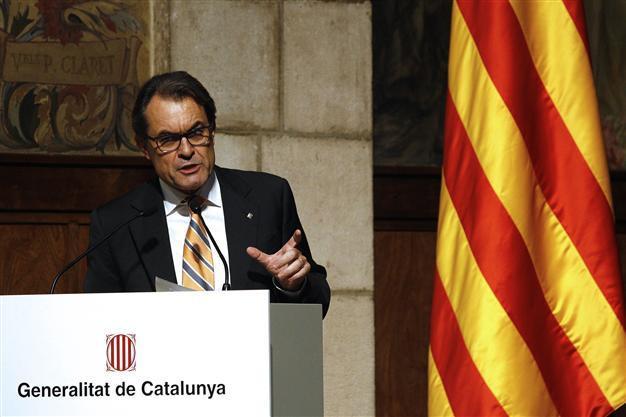Spanish court suspends Catalonia independence vote
BARCELONA - Agence France-Presse

President of Catalonia's regional government Artur Mas delivers a speech during the presentation of the "White Book" on national transition of Catalonia in Barcelona on September 29, 2014. AFP Photo
Spain's Constitutional Court on Monday suspended an independence referendum called by Catalonia for November 9, although leaders of the rich northeastern region vowed to press ahead anyway with preparations for the vote.
The unanimous and expected decision by the court's 12 judges came just hours after Spain's central government asked it to declare the independence referendum illegal on the grounds that it breaches the country's constitution.
The court said in a statement that it had accepted the appeal and had suspended the referendum while it considers the central government's arguments. The court had up to five months to give its ruling although it can request an extension.
The head of the regional government of Catalonia, Artur Mas, signed a decree on Saturday calling for the referendum.
Since then a luminous clock on Barcelona's historic Sant Jaume square has been ticking down the seconds to November 9 and television and radio stations in the region have aired ads informing the public of the vote.
Conservative Prime Minister Mariano Rajoy said he "deeply" regretted Mas's move, saying it "divides Catalans, alienates them from Europe and the rest of Spain and seriously harms their welfare".
In a televised address to the nation following an emergency cabinet meeting, Rajoy said the right to decide a region's status belonged to "all the Spanish people" under the country's 1978 constitution -- the keystone of Spain's democracy after the death of the dictator Francisco Franco.
"There is nothing and no one, no power nor institution, that can break this principle of sole sovereignty," he added.
Buoyed by mass street demonstrations, Mas has pushed ahead for a vote in defiance of Rajoy's warnings.
"You cannot use the law to prevent people indefinitely from stating their opinion," Mas said in a television interview on Sunday in anticipation of Monday's appeal.
"Voting on November is the best thing for everyone because it will allow us and also the Spanish government to know what the Catalan people's opinion is."
Speaking to reporters on Monday in Barcelona, Mas criticised the "supersonic speed" of the Constitutional Court which met just hours after the central government launched its appeal.
"They broke the speed of sound, they did not even wait one day," he said.
Supporters of independence have vowed to continue preparing for the vote, setting up a tense standoff over the coming weeks.
"We are committed to voting on November 9," said Oriol Junqueras, leader of the left-wing Catalan nationalist party ERC, which is allied with Mas's conservative CiU grouping in the regional parliament.
"We are aware of the great difficulties we will face in the coming days but we are ready to face those difficulties."
Fired up by Scotland's independence referendum earlier this month, vast crowds turned out in Barcelona on September 11 to demand their own vote.
Scottish voters eventually chose not to be independent from Britain.
But like Scotland, Catalonia "wants to be heard and it wants to vote," Mas said.
Mas has vowed to let Catalans vote on independence but has also promised to respect Spanish law.
He has hinted that if the government blocks the vote, he could put his leadership at stake in an early regional election, which could serve as a plebiscite on the issue.
Catalonia is Spain's economic powerhouse, accounting for about a fifth of the country's economy. But like the rest of Spain, it suffered from the 2008 property crash and resulting economic downturn.
Ratings agency Fitch put Catalonia on review Monday for a possible downgrade.
Last year Fitch assigned all of Spain's regional governments, including Catalonia, a rating floor of "BBB-" based on the assumption that the central government would continue to provide them with aid such as access to a regional liquidity fund.
"However, this floor is also subject to the co-operative relationship between the regions and the central government and Fitch considers this as difficult in the case of Catalonia under present circumstances," it said.
Proud of their Catalan language and culture, many of the region's 7.5 million inhabitants feel short-changed by the government in Madrid which redistributes their taxes.
The independence movement in Catalonia has gathered strength in recent years as Spain's economic crisis has increased unemployment and hardship in the region and swelled its debts.
Catalonia formally adopted the status of a "nation" in 2006 but the Constitutional Court overruled that claim.
The main opposition Socialist Party is calling for a constitutional reform instead of a vote to answer Catalan demands for greater autonomy.
The Socialists' leader Pedro Sanchez on Monday said the referendum plan "deeply damages Spanish democracy".
